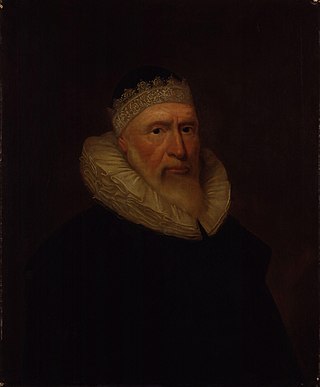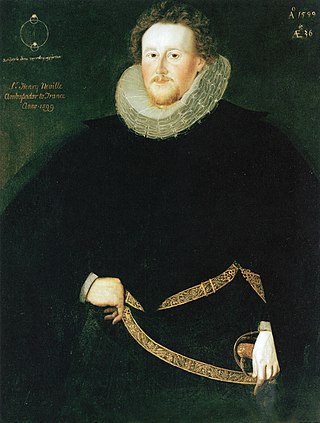Related Research Articles

Sir Julius Caesar was an English lawyer, judge and politician who sat in the House of Commons at various times between 1589 and 1622. He was also known as Julius Adelmare.

Thomas Farnaby was an English schoolmaster and scholar. He operated a successful school in the Cripplegate ward of London and enjoyed great success with his annotations of classic Latin authors and textbooks on rhetoric and Latin grammar.

Sir Henry Neville was an English courtier, politician and diplomat, noted for his role as ambassador to France and his unsuccessful attempts to negotiate between James I of England and the Houses of Parliament. In 2005, Neville was put forward as a candidate for the authorship of Shakespeare's works.
Junius was the pseudonym of a writer who contributed a series of political letters critical of the government of King George III to the Public Advertiser, from 21 January 1769 to 21 January 1772 as well as several other London newspapers such as the London Evening Post.

Thomas Fairfax, 1st Lord Fairfax of Cameron was an English military officer, diplomat, politician and peer.

Fleetwood is an Anglo-Swedish baronial family. The lineage was introduced with number 49 in the House of Nobility, also known as the Riddarhuset.
Sir Nathaniel Brent was an English college head.
The post of Lord President of Munster was the most important office in the English government of the Irish province of Munster from its introduction in the Elizabethan era for a century, to 1672, a period including the Desmond Rebellions in Munster, the Nine Years' War, and the Irish Rebellion of 1641. The Lord President was subject to the Lord Deputy of Ireland, but had full authority within the province, extending to civil, criminal, and church legal matters, the imposition of martial law, official appointments, and command of military forces. Some appointments to military governor of Munster were not accompanied by the status of President. The width of his powers led to frequent clashes with the longer established courts, and in 1622 the President, Donogh O'Brien, 4th Earl of Thomond, was warned sharply not to "intermeddle" with cases which were properly the business of those courts. He was assisted by a Council whose members included the Chief Justice of Munster, another justice and the Attorney General for the Province. By 1620 his council was permanently based in Limerick.
Thomas Newton was an English clergyman, poet, author and translator.
Thomas Drant (c.1540–1578) was an English clergyman and poet. Work of his on prosody was known to Sir Philip Sidney and Edmund Spenser. He was in the intellectual court circle known as the 'Areopagus', and including, as well as Sidney, Edward Dyer, Gabriel Harvey, and Daniel Rogers. He translated Horace into English, taking a free line in consideration of the Roman poet's secular status; but he mentioned he found Horace harder than Homer. Drant's translation was the first complete one of the Satires in English, in fourteeners, but makes some radical changes of content.
The Lord President of Connaught was a military leader with wide-ranging powers, reaching into the civil sphere, in the English government of Connaught in Ireland, in the sixteenth and seventeenth centuries. The office was created in 1569, and in 1604 was reconstituted with full powers to hear all civil suits, to impose martial law and to proceed with "fire and sword" against the King's enemies. The width of his powers gave rise to clashes with the longer established courts: in 1622 he and the Lord President of Munster were ordered not to "intermeddle' in cases which were properly within the remit of those courts. He was assisted by a council whose members included the Chief Justice of Connacht, one or two associate justices and the Attorney General for the Province of Connacht. The office was abolished in 1672.

Robert Cooke was an English Officer of Arms during the reign of Elizabeth I, who rose swiftly through the ranks of the College of Arms to Clarenceux King of Arms, serving in that office from 1567 until his death in 1592–3.
William Fleetwood was an English lawyer and politician. He was Member of Parliament for Marlborough in 1558, Lancaster in 1559 and 1567, and for the City of London several times between 1572 and 1592, but his most significant position was as Recorder of London from 1571 to 1591. A lawyer of the Middle Temple, he was a Queen's Serjeant in 1592.

Sir Henry Fanshawe (1569–1616) was a Member of the English Parliament who held the office of Remembrancer of the Exchequer.
Sir Daniel Fleming (1633–1701), was an English antiquarian and politician.
The Lieutenant of the Duchy of Aquitaine was an officer charged with governing the Duchy of Aquitaine on behalf of the King of England. Unlike the seneschalcy of Gascony, the lieutenancy was not a permanent office. Lieutenants were appointed in times of emergency, due either to an external threat or internal unrest. The lieutenant had quasi-viceregal authority and so was usually a man of high rank, usually English and often of the royal family.
The parliamentary visitation of the University of Oxford was a political and religious purge taking place from 1647, for a number of years. Many Masters and Fellows of Colleges lost their positions.
Sir James Alleyn was an Irish judge of the fifteenth century. He held the offices of Speaker of the Irish Privy Council, Chief Justice of the Common Pleas for Ireland and Lord Chief Justice of Ireland.
References
- 1 2 3 Stephen, Leslie, ed. (1889). . Dictionary of National Biography . Vol. 19. London: Smith, Elder & Co.
- Attribution
![]() This article incorporates text from a publication now in the public domain : Stephen, Leslie, ed. (1889). "Fletcher, Robert". Dictionary of National Biography . Vol. 19. London: Smith, Elder & Co.
This article incorporates text from a publication now in the public domain : Stephen, Leslie, ed. (1889). "Fletcher, Robert". Dictionary of National Biography . Vol. 19. London: Smith, Elder & Co.